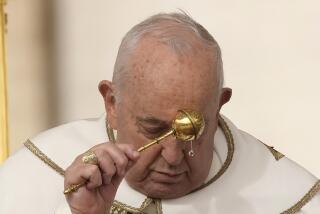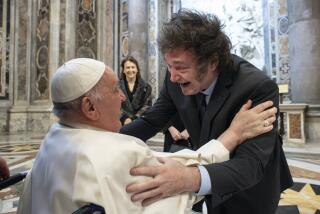Pope Francis chides Brazilâs leaders during visit to notorious slum
RIO DE JANEIRO -- Pope Francis waded into the heart of Brazilâs troubles Thursday, telling residents of an often-violent slum that their leaders must do a better job of helping them.
The potentially provocative comments were in keeping with the causes held most dear by the first pope from the Americas: social justice and reaching out to the poor.
âI would like to make an appeal to those in possession of greater resources, to public authorities and to all people of good will who are working for social justice,â the pope told a rain-soaked crowd in the Varginha favela, or slum.
âNever tire of working for a more just world, marked by greater solidarity,â he said to enthusiastic applause. âNo one can remain insensitive to the inequalities that persist in the world.â
Varginha, a slum so poor and violent it is sometimes called the Gaza Strip, has benefited from small improvements from the government in an effort to staunch social unrest. But the pope seemed to be saying that such efforts were not enough.
âHere, as in the whole of Brazil, there are many young people.... You have a particular sensitivity towards injustice, but you are often disappointed by facts that speak of corruption on the part of people who put their own interests before the common good,â the pope said at a recently refurbished soccer field.
âTo you and to all, I repeat: Never yield to discouragement, do not lose trust, do not allow your hope to be extinguished. Situations can change, people can change.â
It was the most political message yet in the popeâs pilgrimage to Brazil and he must have had in mind the enormous protests that erupted last month among Brazilians angered by government corruption, excessive state spending on sports events and lack of basic opportunities and services such as education and healthcare.
Venturing into the Varginha favela was probably the trickiest event in the popeâs week in Brazil, his first overseas trip since his election in March and one that has brought him to his native continent.
Security, already frayed by Francisâ tendency to ignore the restrictive rules, and sheer logistics were complicated. The recently paved streets inside the favela are narrow; large parts of the slum are essentially in ruins, and the crowds, though perhaps admiring of the pope, are unpredictable.
But the visit seemed to go off without major hitches.
âIâm so excited, Iâm going to cry,â Rosa dos Santos, one of the residents greeting the pope, told reporters.
âThis is really important for us,â said Milena de Souza, 26, an office worker. âHeâs a representative of humility and caring and most importantly, true peace, which is something we need here. Because of all the violence weâve had here, hopefully, the pope can bless us.â
Less than 24 hours before the Argentine-born pontiffâs scheduled arrival, the neighborhood of about 36,000 people was still getting spiffed up. Cement walls were being poured, and state workers were laying electrical cables. For days, military police have been out in full force, but drug traffickersâ graffiti has kept reappearing.
âI am absolutely sure the only reasonâ for the improvements âis that the pope is coming,â said Rita de Cassia, 37, an occasional maid who was helping out at the small stone St. Jeronimo Emiliano church where the pope will pray.
Francis traveled to Varginha on Rio de Janeiroâs northern edge in a relatively modest silver sedan, not a limo, seated in the back and with the window rolled down. He then transferred to an open-sided âpopemobileâ from which he waved at followers that swarmed the vehicle and kissed the occasional baby hoisted in his direction.
Government sharpshooters lined the route.
Hundreds of residents and visiting pilgrims waited in cold, steady rain for the pope to arrive. Earlier in the day, he received the keys to the city and blessed some of Brazilâs potential Olympic athletes.
Varginha, built on old swampland, is one of several favelas that have been âpacified,â meaning the drug lords who once ran the place have been ejected or subdued by authorities, and the government has allocated money for community centers, libraries and a train station. But residents say they have received more broken promises than actual help, and basic services like sanitation remain woefully unavailable. They also complain that police are heavy-handed and abusive, treating everyone like a criminal.
After praying at the chapel, Francis entered a small, freshly painted home festooned with balloons in the Vatican colors of yellow and white.
The folksiness that has characterized the former Cardinal Jorge Mario Bergoglio of Buenos Aires was on display.
âFrom the start,â the pope said, âmy wish in planning this visit to Brazil was to be able to visit every district throughout the nation. I would have liked to knock on every door, to say âgood morning,â to ask for a glass of cold water, to take a cafezinho, to speak as one would to family friends.
âBut Brazil is so vast! It is impossible to knock on every door,â he said.
And so, he said, the favela would represent âevery district of Brazil.â
ALSO:
Spain derailment: Two official investigations launched
China indictment: Bo Xilai bribery trial could begin soon
Montenegro gay rights clash could slow bid to join European Union
Twitter: @tracykwilkinson
Special correspondent Vincent Bevins contributed to this report.
More to Read
Sign up for Essential California
The most important California stories and recommendations in your inbox every morning.
You may occasionally receive promotional content from the Los Angeles Times.











